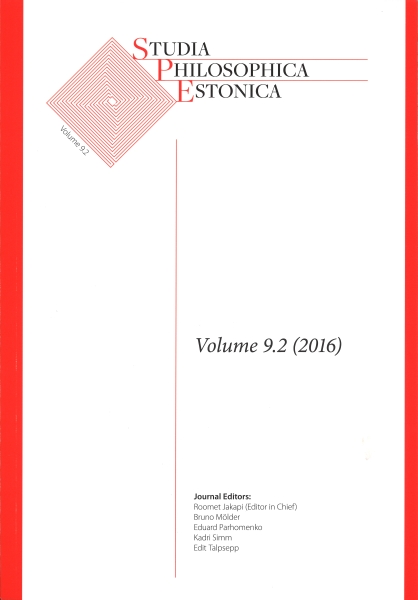Strenghts and Weaknesses of Habermas' Pragmatic Realism
DOI:
https://doi.org/10.12697/spe.2016.9.2.02Keywords:
Habermas, realism, truthAbstract
After analysing Habermas's philosophical evolution from his theory of interests to his late pragmatic realism (1), I will focus on the problems of this last conception (2), trying to draw a plausible way out which avoids both naturalistic reductionism and a too weak form of realism (3).
References
Albinus 2013: Can Science Cope with More Than One World? A Cross-Reading of Habermas, Popper, and Searle, Journal for General Philosophy of Science, 44 (1), pp. 3-20
APEL 2003: “Wahrheit als regulative Idee”, in BÖhler, D., Kettner, M., Skirbekk, G. [hrsg.], Reflexion und Verantwortung. Auseinandersetzungen mit Karl-Otto Apel, Frankfurt a.M., Suhrkamp, pp. 171-198
Cooke 1994: Language and Reason. A study of Habermas's Pragmatics, MIT Press, Cambridge
Cooke, Habermas 1998: (ed.) On the Pragmatics of Communication, MIT Press, Cambridge
Cooke 2002: Argumentation and Transformation, Argumentation, 16 (1), pp. 79-108
Cooke 2006a: Re-Presenting the Good Society, MIT Press, Cambridge
Engel 2015: “Against Truth Pluralism”, in Lecis, Busacchi, Salis 201 pp. 249-266
Habermas 1963: Theorie und Praxis. Sozialphilosophische Studien, Luchterland, Neuwied-Berlin 1963/78
Habermas 1963a: “Einige Schwierigkeiten beim Versuch, Theorie und Praxis zu vermitteln”, in Habermas 196 pp. 9-47
Habermas 1963c: “Dogmatismus, Vernunft und Entscheidung - Zu Theorie und Praxis in der verwissenschaftlichten Zivilization”, in Habermas 196 pp. 307-335
Habermas 1965a: Erkenntnis und Interesse, Merkur, 213 (12), pp. 1139-1153
Habermas 1981: Theorie des kommunikativen Handelns, Suhrkamp, Frankfurt a. M., I-II
Habermas 1988: Nachmetaphysisches Denken. Philosophische Aufsätze, Suhrkamp, Frankfurt a. M.
Habermas 1988b: “Zur Kritik der Bedeutungstheorie”, in Habermas 198 pp. 105-135
Habermas 1988d: “Handlungen, Sprechakte, sprachlich vermittelte Interaktionen und Lebenswelt”, in Habermas 198 pp. 63-104
Habermas 1999: Wahrheit und Rechtfertigung. Philosophische Aufsätze, Suhrkamp, Frankfurt a. M.
Habermas 2005: “Die intersubjektive Verfassung des normengeleiteten Geistes”, in Zwischen Naturalismus und Religion. Philosophische Aufsätze, Suhrkamp, Frankfurt a. M., pp. 15-105
Habermas 2005a: “'Ich selber bin ja ein StÜck Natur'. Adorno Über die Naturverflochtenheit der Vernunft”, in Id., Zwischen Naturalismus und Religion, pp. 187-215
Habermas 2005b: “Freiheit und Determinismus”, in Id., Zwischen Naturalismus und Religion, pp. 155-186
Habermas 2007: The Language Game of Responsible Agency and the Problem of Free Will. How can epistemic dualism be reconciled with ontological monism?, Philosophical Explorations: An International Journal for the Philosophy of Mind and Action, 10 (1), pp. 13-50
Habermas 2012: Nachmetaphysisces Denken II. Aufsätze und Repliken, Suhrkamp, Frankfurt a. M.
Langlois 2003: Habermas et la question de la verite, Archives de Philosophie, 3 (66), pp. 563-583
Lecis, Busacchi, Salis 2015: (eds.), Realte, verite, rappresentazione, FrancoAngeli, Milano 2015
Levine 2010: Habermas, Kantian pragmatism, and truth, Philosophy and Social Criticism, 36 (6), pp. 677-695
Levine 2011: Truth and Moral Validity: on Habermas'Domesticated Pragmatism, in Constellations, 18 (2), pp. 244-259
Radder 2012: The Material Realization of Science. From Habermas to Experimentation and Referential Realism, Springer, Dordrecht
Searle 1995: The Construction of Social Reality, Free Press, New York
Zuidervaart 2012: How not to be an anti-realist: Habermas, Truth and Justification, Philosophia Reformata, 77 (1), pp. 1-18





